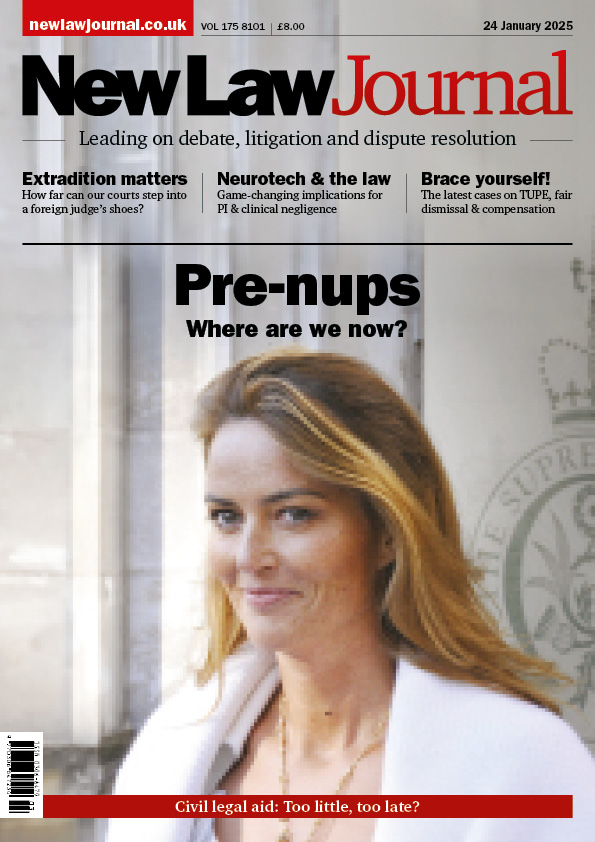THIS ISSUE

A test case on extradition has been granted permission to appeal to the Supreme Court. Writing in this week’s NLJ, George Hepburne Scott, barrister at Church Court Chambers, explains the issue—a lack of consensus among High Court judges about the extent to which they can take account of the prospect of early release overseas.
The validity of pre-nuptial agreements remains an inexact science. In this week’s NLJ, Mark Pawlowski, barrister and professor emeritus of property law, School of Law, University of Greenwich, examines recent caselaw, including cases involving foreign pre-nups where parties have subsequently sought divorce in the English courts.
Advances in implantable neurotechnologies could have a profound impact on rehabilitation, with consequent game-changing implications for personal injury and clinical negligence claims, Harry Lambert, barrister at Crown Office Chambers, explains in this week’s NLJ.
Two defendant states, Spain and Zimbabwe, who challenged the registration in English courts of arbitration awards made against them, came a cropper in the Court of Appeal last year. Writing in this week’s NLJ, international arbitration specialists Neil Newing, partner, and Pietro Grassi, senior associate, at Signature Litigation, explore the ruling in the combined case and its implications.
The Ministry of Justice’s latest review of civil justice has failed to inspire Roger Smith, former director of Justice. In his NLJ column this week, he reveals he read all seven reports over the new year and ‘did so with a heavy heart’.
Reading between the lines of the government’s latest review of the civil legal aid system, Roger Smith unearths the same old fundamental problems at its heart
To what extent are pre-nuptial agreements now recognised under English law? Mark Pawlowski weighs up the latest decisions
Ian Smith recommends a stiff drink & a towel around the head before plunging into the latest cases on TUPE, fair dismissal & enhanced compensation
To what extent can an English extradition court take account of the prospect of early release overseas? George Hepburne Scott calls for clarity
Coming advances in neurotechnology & their potential impact upon rehabilitation will be nothing short of transformational: Harry Lambert outlines their game-changing implications for personal injury & clinical negligence
MOVERS & SHAKERS

Carey Olsen—Kim Paiva
Group partner joins Guernsey banking and finance practice
.tmb-mov69x69.jpg?sfvrsn=16d9dd3d_1)
Morgan Lewis—Kat Gibson
London labour and employment team announces partner hire

Foot Anstey McKees—Chris Milligan & Michael Kelly
Double partner appointment marks Belfast expansion
NEWS
The Ministry of Justice (MoJ) has not done enough to protect the future sustainability of the legal aid market, MPs have warned
Writing in NLJ this week, NLJ columnist Dominic Regan surveys a landscape marked by leapfrog appeals, costs skirmishes and notable retirements. With an appeal in Mazur due to be heard next month, Regan notes that uncertainties remain over who will intervene, and hopes for the involvement of the Lady Chief Justice and the Master of the Rolls in deciding the all-important outcome
After the Southport murders and the misinformation that followed, contempt of court law has come under intense scrutiny. In this week's NLJ, Lawrence McNamara and Lauren Schaefer of the Law Commission unpack proposals aimed at restoring clarity without sacrificing fair trial rights
The latest Home Office figures confirm that stop and search remains both controversial and diminished. Writing in NLJ this week, Neil Parpworth of De Montfort University analyses data showing historically low use of s 1 PACE powers, with drugs searches dominating what remains
Boris Johnson’s 2019 attempt to shut down Parliament remains a constitutional cautionary tale. The move, framed as a routine exercise of the royal prerogative, was in truth an extraordinary effort to sideline Parliament at the height of the Brexit crisis. Writing in NLJ this week, Professor Graham Zellick KC dissects how prorogation was wrongly assumed to be beyond judicial scrutiny, only for the Supreme Court to intervene unanimously







